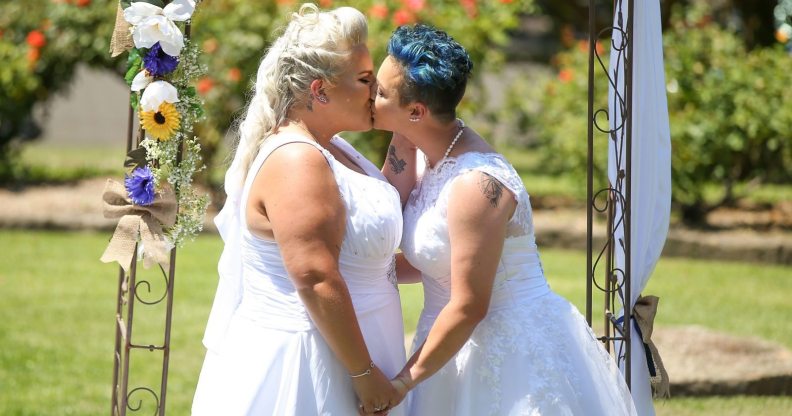Australian Conservatives pledge to overturn same-sex marriage

Getty
Politicians in Australia have pledged to overturn the right of same-sex couples to marry, despite the decision being backed by millions of voters last year.
Spokesman Lyle Shelton said the Australian Conservatives party will continue to campaign for “the natural family” in the wake of the legalisation of marriage equality
“I would expect over time we’d want to see marriage restored in our legislation and culture,” he told Sky News Australia.

Thousands gather in Prince Alfred Park in Sydney for the result of the vote (Photo by Cole Bennetts/Getty Images)
Shelton says the party supports the natural family and wants to be advocates for “mum, dad and the kids.”
He said: “We’re a part of principles, and one of our five pillars is family. I don’t expect this plebiscite can be overturned soon.
“But what Australian politics does need is a party that knows what the family is. And one that is willing to advocate for it.
He added that “our policy is to support the natural family.”

(Getty)
Shelton previously worked as Communications Director for the Australian Christian Lobby, and is a long-time opponent of LGBT equality measures.
.@LyleShelton: Over time the @AuConservatives want to see marriage restored, that is an aspiration that is part of our party policy. https://t.co/xOZrK2UZS9 pic.twitter.com/rgdWJv5QeX
— Sky News Australia (@SkyNewsAust) February 5, 2018
While the right-wing party may want to overturn the democratic result, most politicians and voters have accepted the result.
Even Tony Abbott – a staunch opponent of the measure while prime minister and during the national ballot – attended the same-sex nuptials of his sister.

Australian Olympic swimmer Ian Thorpe (L) joins equality ambassadors and volunteers from the Equality Campaign
The first Australians married last month as a change in the law allowed couples to tie the knot.
Because the country has a month-long notice period for couples waiting to marry,the first wave of same-sex unions was not able to begin until January 9 – one month from the date of the law coming into effect.

(Getty)
But several couples couldn’t wait to tie the knot and did so at midnight as the law officially changed.
Lisa and Kylie Caro married also in Sydney, describing their wedding as “surreal”.
The couple actually put on their white gowns eighteen months ago and walked down the aisle for a commitment ceremony in Centennial Park.

(Getty)
But they did so shortly after midnight to legally wed, again at Centennial Park, joined by their young daughter Isla.
“There wasn’t a dry eye in the house,” Kylie told SMH. “We’re both still on cloud nine.”
The couple met in 2013 and say they quickly realised they are “soulmates”.
“We thought maybe in five or 10 years we might renew our vows and legalise it at that point, but as the bill changed and the emotions grew we realised we actually did want this more than we were letting on to ourselves,” Kylie adds.

(Getty)
Australia’s parliament in December legalised same-sex marriage, passing a bill to allow two people, regardless of sex, to marry.
It came after almost 13 million Australians (79.5%) voted in the country’s non-binding postal ballot to endorse the law.
The motion was approved almost unanimously by the House of Representatives, after passing the upper chamber the previous week.

(Getty)
Royal Assent was given to the same-sex marriage law on 8 December following on from a historic postal vote earlier in the year which saw more than 61 percent of Australians vote Yes for same-sex marriage.
But the process to legalise same-sex marriage which included a non-binding postal vote was criticised by the United Nations Human Rights Council and LGBT rights campaigners.
The council said Australians were put “through an unnecessary and divisive public opinion poll.”

